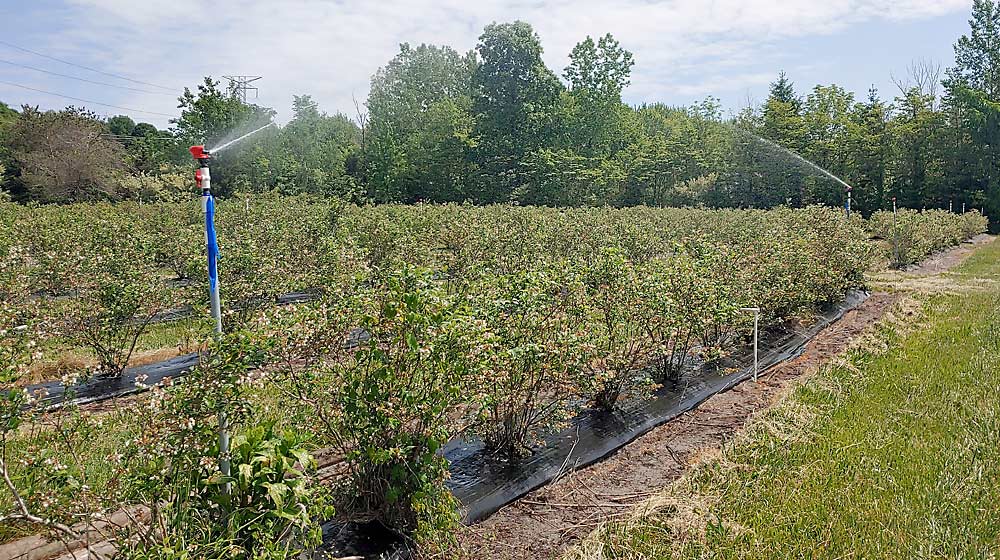[ad_1]

Until recently, Michigan blueberry growers didn’t have to worry too much about extreme heat during bloom. May temperatures in Michigan generally range from 65 to 75 degrees Fahrenheit. But in two of the past six seasons — 2018 and 2022 — temperatures reached higher than 90 degrees in late May, followed by drastic reductions in yield at harvest time.
Too much heat during bloom can disrupt the pollination process. Fortunately, Michigan State University researchers already have a mitigation tactic to offer growers keeping a careful eye on unseasonably warm weather: overhead irrigation.
The lab of MSU entomology professor Rufus Isaacs has found that hot bloom periods can disrupt blueberry pollination in at least two ways. If heat accumulates too rapidly, so many flowers open up at once that the bees don’t have time to visit them all. Extreme heat can also damage pollen itself.
Studies have found that exposing blueberry pollen to temperatures over 90 degrees Fahrenheit for a few hours can lead to declines in germination and pollen tube growth, which can lead to smaller yields and lower fruit quality, said doctoral student Jenna Walters.
“The pollen was basically killed,” Walters said. “Our hypothesis is that when heat is applied to open or developing flowers, it can disrupt the nutrients present in pollen that drive reproductive processes, which could lead to consequences for fruit fertilization, yields, and also for bees visiting flowers.”
Fortunately, there is a straightforward solution — as long as you’re equipped with overhead irrigation.
Here’s their recommendation: When temperatures exceed 90 degrees during bloom, turn on overhead irrigation to cool the bushes. This lessens the chance of heat stress and pollen damage.
Walters’ work is part of a multistate blueberry pollination project funded by a $2 million grant from the U.S. Department of Agriculture’s Specialty Crop Research Initiative. She got the cooling idea from an Oregon State University trial that applied overhead irrigation to blueberries to protect them from heat damage during summer ripening. The OSU researchers discovered that brief periods of overhead irrigation decreased temperatures in blueberry canopies by 5 to 10 degrees. Most Michigan blueberry growers have overhead irrigation, Walters thought, and if you can use it to protect ripening berries in summer, why not use it to protect pollen during bloom?
The MSU researchers tested overhead irrigation during bloom in 2023. When air temperatures exceeded 85 degrees, they used overhead sprinklers on Bluecrop bushes at MSU’s Trevor Nichols Research Center. The sprinklers ran for 15 minutes every hour, cooling the canopy by 5 to 10 degrees, compared to the untreated bushes.
Cooling also prolongs the duration of bloom, which prolongs pollinator access. Walters said trickle irrigation, being close to the ground, wouldn’t have the same effects because it doesn’t cool the canopy.
The MSU researchers shared their findings with researchers in the Pacific Northwest, where heat during bloom is also becoming more of a problem.
Oregon blueberry growers were hit with unprecedented temperatures in spring 2023 — 90-plus degrees in the middle of May, when most varieties were in peak bloom. The state’s total blueberry production was down 27 percent from 2022, largely due to the heat’s effect on pollen viability and ovule longevity. Commercial blueberry fields cooled by overhead irrigation during bloom had better fruit set than those not cooled by overhead irrigation, said OSU horticulture professor Wei Yang.
But not every grower in the region is equipped with overhead irrigation.
Washington State University associate professor Lisa Wasko DeVetter said many blueberry growers west of the Cascade Range have drip irrigation, not overheads that can do evaporative cooling. Their plants simply weathered the heat last year, and subsequent crop loss was attributed to reduced pollen viability.
Wasko DeVetter, Isaacs and other researchers are proposing another project that will further study ways to reduce heat damage during bloom. They envision continued work with overhead cooling systems, as well as biostimulants, she said.
—by Matt Milkovich
[ad_2]









